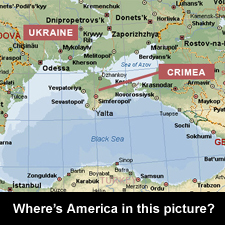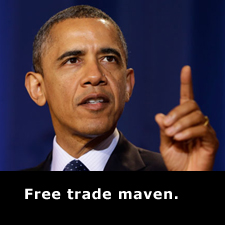I won’t waste any breath on much of what’s happened in politics this week … that Hobby Lobby suit before the Supreme Court has got me hopping mad, but I’ll hold that for another week while I take the President to task for his speech to “European youth” about the Crimean crisis. One particular passage is very worthy of attention:
Russia has pointed to America’s decision to go into Iraq as an example of Western hypocrisy. Now, it is true that the Iraq War was a subject of vigorous debate not just around the world, but in the United States as well. I participated in that debate and I opposed our military intervention there. But even in Iraq, America sought to work within the international system. We did not claim or annex Iraq’s territory. We did not grab its resources for our own gain. Instead, we ended our war and left Iraq to its people and a fully sovereign Iraqi state that could make decisions about its own future.

Here, Barry seems to be saying that it’s all right to ignore the clear will of the UN Security Council (and General Assembly) and invade another country, so long as eight years later you leave what’s left of them to sort out their political future ( this after their refusing to sign off on a status of forces agreement we were pushing for). It’s as if the dubious notion that we had a “vigorous debate” (perhaps in the street, but certainly not in the mass media) prior to starting the Iraq War somehow makes up for the fact that we went into that country on obviously false pretenses, over the objections of major allies and partners, including Russia.
That was bad enough. But just the fact that we are comparing Russia’s incursion into Crimea (death toll: less than ten, to greatly exaggerate the actual number) unfavorably with our attack on Iraq (death toll: hundreds of thousands, with fratricidal violence still killing thousands a year long after our exist) is craven beyond belief. He didn’t even mention the continuing conflict in Afghanistan. Small omission.
Finally, the resource point is a red herring. We didn’t go into Iraq to “grab its resources for our own gain”, though how that fact makes us virtuous is beyond me. Still, if Iraq’s main export was chicken wings, we would never have been there. It isn’t about stealing the oil; it’s about having a say in where it goes and where it doesn’t go. That’s as old as the American empire, and twice as thick.
Russia is a bad actor, no denying it, but we are far worse. Before we start condemning them for mustering their soldiers within their own borders, we might consider pulling ours out of the scores of countries where they are stationed, all around the world.
luv u,
jp

 Right, well … I was never a big fan of Dave’s, but you get the idea. Part of the problem with our once-over-lightly media culture is that there is an extraordinarily rapid resort to black-and-white, wrong vs. right narratives that are easy to report, easy to digest, easy to repeat again and again. In all that, we lose the sense that it’s possible to have two assholes in a fight – adversaries who are divided by conflicting claims, not by a contrast between absolute good and absolute evil.
Right, well … I was never a big fan of Dave’s, but you get the idea. Part of the problem with our once-over-lightly media culture is that there is an extraordinarily rapid resort to black-and-white, wrong vs. right narratives that are easy to report, easy to digest, easy to repeat again and again. In all that, we lose the sense that it’s possible to have two assholes in a fight – adversaries who are divided by conflicting claims, not by a contrast between absolute good and absolute evil. parties typically do an end-run around this by simply avoiding the word when it’s inconvenient. We’ve done this with Egypt and with Honduras. When it’s someone we don’t like, it’s a coup, plain and simple. In Kiev, the elected leader of the country was ousted without due process, in the midst of a negotiation over rebalancing of political authority and early elections. It’s not outlandish to call that a coup, regardless of how kleptocratic the old regime may have been.
parties typically do an end-run around this by simply avoiding the word when it’s inconvenient. We’ve done this with Egypt and with Honduras. When it’s someone we don’t like, it’s a coup, plain and simple. In Kiev, the elected leader of the country was ousted without due process, in the midst of a negotiation over rebalancing of political authority and early elections. It’s not outlandish to call that a coup, regardless of how kleptocratic the old regime may have been. be sure. There is a referendum on Crimean secession scheduled for later this month, and the new Ukrainian government is crying foul. So … are we on the brink of a new Crimean War? Charge of the Light Brigade, anyone?
be sure. There is a referendum on Crimean secession scheduled for later this month, and the new Ukrainian government is crying foul. So … are we on the brink of a new Crimean War? Charge of the Light Brigade, anyone? someone you could describe as disappointed in the president: he is very much the kind of leader I expected him to be following his 2008 election. Probably the most prescient look at the then-early Obama presidency in 2009 was published in Harper‘s under the title
someone you could describe as disappointed in the president: he is very much the kind of leader I expected him to be following his 2008 election. Probably the most prescient look at the then-early Obama presidency in 2009 was published in Harper‘s under the title  What irks me, though, is the legitimization of truly extremist right-wing notions of governance (or lack of same) through what I’m sure NPR and other networks consider “balance coverage”. A brief example: yesterday there was a
What irks me, though, is the legitimization of truly extremist right-wing notions of governance (or lack of same) through what I’m sure NPR and other networks consider “balance coverage”. A brief example: yesterday there was a  pact that is described even by bland media outlets like NPR as having benefited only corporations in the 3 countries affected. Twenty years after its passage and signing by President Clinton, the evidence is in and it seems clear that many if not all of the criticisms were justified. And now that it is well-established and that we have entered into numerous other trade deals modeled on NAFTA, mainstream news organizations can report the obvious, namely:
pact that is described even by bland media outlets like NPR as having benefited only corporations in the 3 countries affected. Twenty years after its passage and signing by President Clinton, the evidence is in and it seems clear that many if not all of the criticisms were justified. And now that it is well-established and that we have entered into numerous other trade deals modeled on NAFTA, mainstream news organizations can report the obvious, namely: People losing health insurance. This is a shocker, but people have always been booted out of their health plans. This is nothing new. Sure, Obama didn’t qualify his claim that people could stick with their policies if they liked them. But the media’s claim that this amounts to the President’s “Katrina moment” is simply ludicrous. All of the examples of people who have been forced off of their substandard plans have involved people who can generally afford better. One brought forward by NBC was a freaking attorney in Washington. Come on!
People losing health insurance. This is a shocker, but people have always been booted out of their health plans. This is nothing new. Sure, Obama didn’t qualify his claim that people could stick with their policies if they liked them. But the media’s claim that this amounts to the President’s “Katrina moment” is simply ludicrous. All of the examples of people who have been forced off of their substandard plans have involved people who can generally afford better. One brought forward by NBC was a freaking attorney in Washington. Come on! Our drone war in Pakistan-Afghanistan, and essentially everywhere else, runs on a similar principle. It isn’t as all-out, of course, but it appears to be nearly as random. And just as every living thing in the Vietnamese countryside was assumed to be Viet Cong, every military age male in the tribal areas of Pakistan is, by definition, an extremist, a combatant, a terrorist, and therefore the target of killer drones, piloted by some dude who works at a terminal in a trailer about fifty miles from where I’m sitting right now.
Our drone war in Pakistan-Afghanistan, and essentially everywhere else, runs on a similar principle. It isn’t as all-out, of course, but it appears to be nearly as random. And just as every living thing in the Vietnamese countryside was assumed to be Viet Cong, every military age male in the tribal areas of Pakistan is, by definition, an extremist, a combatant, a terrorist, and therefore the target of killer drones, piloted by some dude who works at a terminal in a trailer about fifty miles from where I’m sitting right now. it before implementation of the Affordable Care Act, sure, you can keep that dog – it’s grandfathered in. The insurance companies simply can’t continue selling those policies now that the law is in effect because – and this is important – THEY SUCK TOO BADLY, and because of that, they do not comply with the law.
it before implementation of the Affordable Care Act, sure, you can keep that dog – it’s grandfathered in. The insurance companies simply can’t continue selling those policies now that the law is in effect because – and this is important – THEY SUCK TOO BADLY, and because of that, they do not comply with the law.